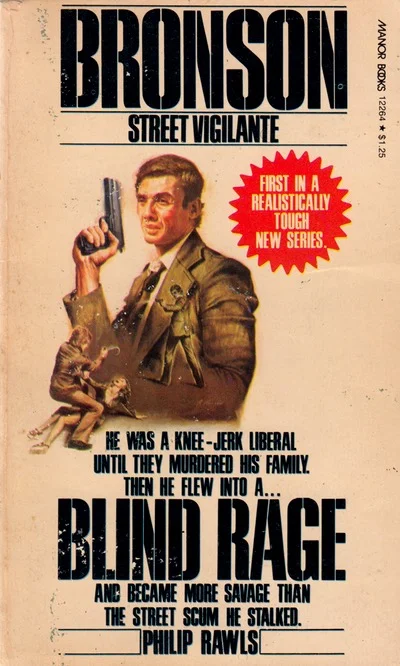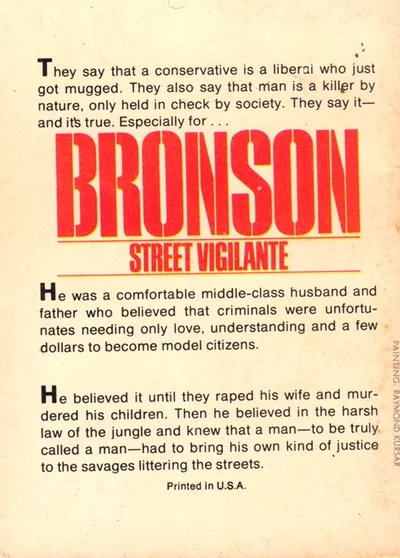Well. That was unpleasant.
In 1972, Brian Garfield wrote Death Wish, a novel about an overweight Manhattan liberal who buys a gun and tries to take the law into his own hands after his wife and daughter are mugged (wife dies, daughter goes catatonic). Garfield himself said, "God, I couldn't see how you could get a screenplay out of Death Wish," but in 1974 Michael Winner directed the movie version, starring Charles Bronson, and it caught cultural lightning in a bottle. Today, the movie still holds up, not just for its grimy Rotten Apple aesthetics, but also for its measured performance by Bronson who genuinely seems to lose his soul and become seriously unhinged as he takes his revenge.
This is not that.
A knock-off series published by Manor books in 1975, Bronson: Street Vigilante - Blind Rage signals it's going to be a little different right from the get-go, and not just because it's set in Cincinnati. No one gets mugged in the first few pages. Instead, on page one, unnamed assailants rape Bronson's wife, stab her to death when they orgasm, then move down the hall and do the exact same thing to Bronson's two small children.
Even though there are eye witnesses, it turns out these sick scum get off because the assailant, Bennie Carver, has an identical twin brother named Bernie Carver and no one can prove which one did it, so the judge lets them both go free. Mitigating factors include the fact that Bennie and Bernie are rich pornographers who produce snuff films, own their very own S&M dungeon, and have compromising film footage of judges, politicians, lawyers, and businessmen that they use for blackmail. We pretty much learn all this by the end of chapter two. Things move fast because a) this book is only 192 pages, and b) the author wants to get Bronson armed and on the path to justice by chapter three so he can spend the rest of the page count expanding on his thesis: everything sucks.
The world smells like "cheap disinfectant and dirty clothes," men die in "the putrid stench of feces," cocks are "slimy", whores are "dirty", and you can't open a drawer or turn on a kitchen light without a swarm of cockroaches scuttling away. When Bronson walks into a hotel it stinks of old vomit and the clerk is picking his nose. When he shoots a man, the corpse falls into a garbage can that dumps its "sticky odorous refuse over him as he rolls into the gutter." Every Hispanic person is in a gang, every black person carries a gun, every woman and gay person is perpetually in heat thanks to Bronson's rugged mandom. Orphanages rent out their 12-year-old charges to rich pedophiles at weekend rates. The world is a pile of garbage.
Bronson isn't much better. When he sees a drunk passed out in the stairwell of his seedy apartment building, he starts kicking the guy for no reason. He's mean to everyone, continually inviting them to go fuck themselves or to "stick it up your ass". His big trick is to tell people he's not going to hurt them if they tell him where Bennie and Bernie are hiding, then he pours hot lye all over their genitals anyways.
Some people are "shoot first, ask questions later" but if Bronson could travel into the past and shoot you before he even meets you, he'd honestly prefer that. After blasting a hole in the nose of Stone, part of the Carver Twins's gang, he turns and shoots a woman who comes innocently walking out of Stone's bathroom. She could be Stone's girlfriend, or his sister, or just someone who wandered into the wrong room. Doesn't matter. The second Bronson sees her he shoots her — with creepy specificity — in her left nipple. We never learn which nostril he shot Stone in. Probably because Bronson is already busy going downstairs to murder the clerk at the front desk just in case the guy saw his face.
His next victim is another girlfriend, this time of the man who rented his flop house to one of the Carver Twins's gang members. All Bronson wants the woman to do is describe the interior of the house so he can get the drop on the guy. Then he shoots her. Then he shoots the gang member. Then he shoots some guys who hassles his 17-year-old girlfriend on the street. Then he tortures some people to death. Then he castrates a guy with a bottle. Then he stomps a witness's skull until it shatters. Then he machine guns the cast and crew of a porn shoot. Then he pistol whips a puppy.
When an elderly black female informant gets in Bronson's car and sees that he's driving around with his gun stuffed down his pants, she observes:
“When you in de car, you ought to lay it on de flo by you feet."
“It would be harder to reach," he says.
“It would be harder to blow your balls off, too.”
That gives you an idea not only of the awful dialect spoken by non-white characters in this book but also of the nuggets of very dark, very dry humor that appear throughout (my favorite bit of understatement is "Bronson found that the automatic had a hair trigger," at the start of a paragraph about him gunning down a roomful of people). But mostly the language is flat and barebones descriptive, rarely giving us any insight into Bronson's mental state as he drives around committing insane murders. Instead, it just spells out in very specific detail what he does, giving the prose the detached, joyless, yet efficient feeling of something written by a psychopath.
No one knows who wrote this book, but there were two more installments in the series both using the Philip Rawls pseudonym:
Streets of Blood written by Len Levinson
Switchblade written by Joseph Chadwick
Relentlessly downbeat, emotions never soar in Bronson's Cincinnati, instead, the violence just gets more, and more baroque, while the relentless worthlessness of every single human being except Bronson stays the same. If the casual racism and rampant homophobia don’t turn you off, the men being eaten alive by rats or the women having their vaginas lit on fire will.
Weirdly enough, as bad as the Carver twins are, the book's real bad guys turn out to be the judges, lawyers, police commissioners, and assorted fat cats who took their hush money and looked the other way. The 1% are the enemy, but don't worry, Bronson evens the score with all of them, too. Which is a weird stance for this book to take because, aside from obsessively describing every single time Bronson wipes his fingerprints off a murder weapon, gear shift, door knob, or end table, the book also talks about his bankroll non-stop. Sometimes Bronson kills with a shotgun, sometimes with a kitchen knife, but he almost always pays someone off, buys weapons, or gets information by pulling out his phat bankroll and peeling off some bills first. In this world, good and bad don't matter, the only lesson to be learned is that the man with the money can do what he wants, while everyone else just gets blasted into kibble.
Towards the climax of the book, one of Bronson's victims begs for mercy. We've actually seen that he just tagged along with the bad guys because he had nothing better to do, and he genuinely didn't want any trouble. When it becomes clear that Bronson's still going to kill him, the guy begs for a minute to pray.
"There’s your prayer, motherfucker," Bronson snarls, blasting his skull into "a stream of pulped brain tissue and blood."

